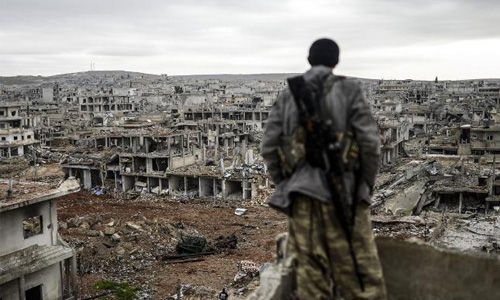Keralites killed in Syria had links with Salafis in Bahrain
Kozhikode : The Kerala youth, who were killed while fighting for the Islamic State in Syria, were the members of an extreme Salafi group in Bahrain before they joined the outfit (IS), The Times of India reported yesterday.
Sources told TOI that the two Salafi preachers from Kerala - one from Mankada in Malappuram and the other from Perumbavoor in Ernakulam - were instrumental in radicalising the youth. Four members of the group, including Muhadis from Vandoor, were killed in military operations within a span four months in Syria.
The Salafi preachers had organised classes at a religious centre in Bahrain and at other places where they injected the extreme Salafism in the youth. A few members of the group were working with a catering company in Bahrain.
Sources said the preachers are members of a splinter group among the Kerala Salafis and have no connection with any of the established Salafi organisations in the state. One among them is currently in Mangaluru and his activities are closely monitored by the security agencies.
After getting initiated into extreme Salafism, the youth were learnt to have contacted some well-known Salafi scholars from Kerala who went to Bahrain at different times. “The Salafi scholars did not entertain the youth as they were found to have strong leanings towards the Islamic State,” sources said.
The youth later came into contact with Abdul Rashid Abdulla, the former employee of the Peace International School in Kozhikode, who had already become a full-fledged IS cadre. It is suspected that the Salafi preachers had a role in helping the youth in establishing contact with Abdul Rashid, who is learnt to have steered them to the IS stronghold in Syria. Rashid himself has landed in Afghanistan and is co-ordinating the propaganda activities of Kerala module.
The unravelling of the Bahrain group has confirmed the suspicion of the security agencies that the influence of the IS runs deep in Kerala than what was initially thought to be. The number of Malayalis who joined the terror outfit could be much higher than the official estimate which is based on missing cases. IS is suspected to have recruited more Malayalis working in the Gulf countries. Authorities feel that the members of the families of the IS recruits are either unaware of their migration to IS strongholds or are keeping mum due to fear of being ostracized by the society. Insights gained regarding the Bahrain group have once again forced the law enforcing agencies to sharpen their focus on the Salafi groups in Kerala. Many youth in the Salafi organisations have lost sense of direction after the innumerable splits in the movement.
Some of these Salafis are indirectly propagating the ideology of the IS though they vehemently oppose the activities of the terror group in the open. Many youth who are associated with extreme Salafi groups finally end up in the tentacles of the Islamic State.
Related Posts

